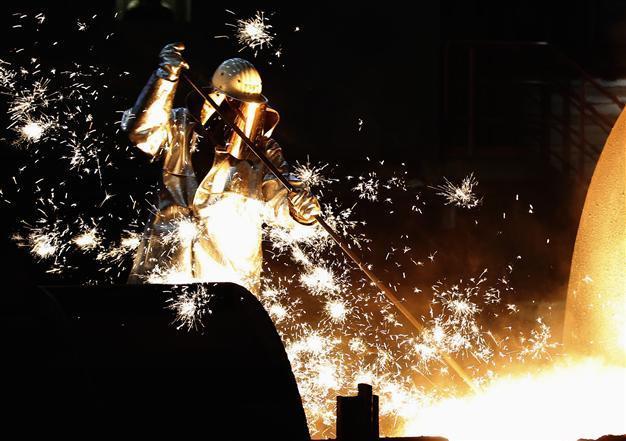German growth falters as industrial sector slumps
FRANKFURT - Agence France-Presse

File picture of a worker controlling a tapping of a blast furnace at Europe's largest steel factory of Germany's industrial conglomerate ThyssenKrupp AG in the western German city of Duisburg. REUTERS Photo
Germany’s unexpected weak industrial data in August have cast a shadow over the performance of Europe’s biggest economy and the entire region for the rest of the year, analysts said Oct. 7.
Following a deep 5.7-percent slump in factory orders as a result of the late timing of the summer holidays, overall industrial output shrank by a massive 4 percent, according to regular data compiled by the economy ministry.
“The setback in industrial production in August was a massive one. Shutdowns in the auto industry due to the late summer holidays played an important role,” said UniCredit economist Andreas Rees.
“We do not expect shrinking GDP (gross domestic product) in the third quarter, and hence a technical recession. However, the envisaged rebound in the third quarter is now at risk,” Rees said.
The German economy shrank by 0.2 percent in the second quarter of this year and another contraction in the third quarter would technically put the country in recession.
But the government, the German central bank and a whole range of think tanks are confident the decline will be short-lived and Germany will return to growth in the third and fourth quarters of this year.
UniCredit’s Rees insisted that while the drop in both industrial orders and industrial output was severe, “there is no reason to panic.”
“German industrial activity will soften in coming months as already indicated by business sentiment but not tumble into the abyss,” he said.
“There is no reason to dig up the R-word again,” he insisted, referring to recession.
The drop in the industrial data was largely technical rather than a sudden deterioration in fundamentals, the expert said.
But Capital Economics economist Jonathan Loynes was more pessimistic. “August’s big drop in industrial production all but confirmed that German industry is back in recession and underlined the need for both the European Central Bank and the German government to give the eurozone’s biggest economy much more policy support,” he said.
The ECB has cut its key interest rates to new all-time lows and has promised to embark on a range of measures to pump cash into the economy.
BayernLB economist Stefan Kipar pointed the finger at uncertainty over the economic fallout of the Ukraine crisis, since Germany has important business ties with Russia which has been hit with a series of EU and U.S. sanctions. But he said he was penciling in “positive, albeit very modest growth” for Germany in the third quarter. Natixis economist Johannes Gareis said the broad-based decline in the industry data “was exacerbated by the timing of German school holidays, which started late this year. Yet, this effect may not explain the whole weakness.”
The data “suggest that the underlying growth trend of the German economy has heavily slowed down,” he said.
Commerzbank economist Ralph Solveen predicted that Germany was likely to see stagnation “at best” in the third quarter.
